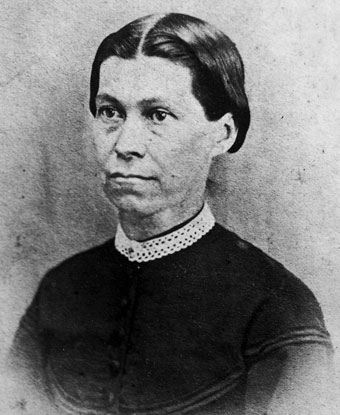Last updated: September 26, 2025
Person
Susan Catherine Koerner Wright

The Smithsonian Institution
Susan Wright was the mother of Wilbur and Orville Wright, the pioneers of powered flight. Though she never witnessed their historic achievements, her intelligence, practicality, and quiet strength left an indelible mark on her sons’ development as inventors and thinkers.
Susan Catherine Koerner was born in Loudoun County, Virginia, to John Gottlieb Koerner, a wagonmaker, and Catherine Freyer Koerner. Shortly after she was born, her family moved to Union County, Indiana. Susan’s family became members of the Church of the United Brethren in Christ, and she was baptized when she was 14. She later attended Hartsville College in Indiana—an uncommon achievement for a woman of her era. There, she studied literature, science, and mathematics, gaining the foundational knowledge that shaped both her domestic life and intellectual influence.
At Hartsville College, she met Milton Wright, an employee of the college, and they began a long courtship. Their partnership began with a mark of quiet independence—when Milton first proposed before a posting to Oregon, Susan reportedly advised him to ask again upon his return. He returned in 1859 and proposed again, and she accepted. Together, they had seven children (five surviving to adulthood) in a household shaped by Susan’s intellect, resourcefulness, and unwavering support for curiosity and learning.
The Wright household was known for its emphasis on learning, values, and hands-on curiosity—qualities fostered largely by Susan herself. Susan managed the home with practical ingenuity. She repaired household appliances, built toys, and nurtured her children’s sense of curiosity. Wilbur and Orville later credited her example as instrumental in developing their mechanical skills. She kept her own toolbox and was known for solving problems with quiet confidence.
Diagnosed with tuberculosis in the early 1880s, Susan’s health declined steadily. Her son Wilbur stayed especially close with her during this time, and their father, Milton, wrote movingly of Wilbur’s tender care. Susan passed away on July 4, 1889, in Dayton, Ohio.
Though not a public figure, Susan Wright’s influence is reflected in the achievements of her sons. Her calm intellect, love of learning, and mechanical skill helped lay the foundation for one of history’s great technological milestones. Orville Wright once described her as “almost perfection itself”—a quiet but enduring source of inspiration.
“We children learned to look upon mother as almost perfection itself… Our mother has gone, but her spirit will ever be with us.”
— Orville Wright, 1889
